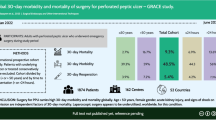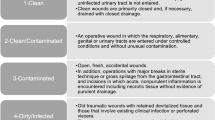Abstract
Background
Metabolic and bariatric surgery (MBS) remains a safe and effective treatment for patients with severe obesity. Recent studies have highlighted racial disparities in perioperative outcomes, including up to a twofold higher mortality rate in non-Hispanic black (NHB) (vs. non-Hispanic white (NHW)) patients. Causality for these disparate outcomes remains unclear and largely unexplored.
Objective
Our study aim was to determine reasons for mortality among racial and ethnic cohorts and MBS patients.
Setting
Academic Hospital.
Methods
Roux-en-Y gastric bypass (RYGB) and sleeve gastrectomy (SG) cases were identified using the 2015 to 2018 Metabolic and Bariatric Surgery Accreditation and Quality Improvement Project (MBSAQIP) database using current procedural (CPT) codes 43,664, 43,645, and 43,775. Multivariate regression analyses were performed to determine independent predictors of overall and bariatric-related mortality. Reasons for mortality were identified and compared between racial and ethnic cohorts.
Results
Of 650,903 RYGB and SG cases, 512,041 were included in our analysis (73% SG). For the entire cohort, all-cause and bariatric-related mortality rates were 0.095% and 0.05%, respectively. Age, male gender, ASA 4, functional status, therapeutic anticoagulation, smoking, COPD, and RYGB were independently associated with both overall and bariatric-related mortality. NHB had increased odds (2.13, p < 0.001) of bariatric-related mortality. Compared to NHW patients (13.3%), venous thromboembolic (VTE) complication was the most common reason for overall mortality in NHB (27.8%) and Hispanic (25%) patients (p < 0.001). VTE-related mortality directly associated with the bariatric procedure was also higher in NHB (34.6%) and Hispanic (33.3%) (vs. NHW 21.0%) patients (p 0.05). When stratified by procedure, mortality causes in RYGB cases were similar between racial and ethnic cohorts. In the SG cohort, the proportion of VTE-related mortality varied significantly (p 0.043) between NHB (39.2%), Hispanic 40.0%, and NHW (20.5%) patients.
Conclusion
There are racial and ethnic differences in causes of mortality following bariatric surgery. The predominant cause of overall and bariatric-related mortality in NHB bariatric surgery patients is postoperative venous thromboembolism. More granular MBSAQIP data capture is needed to determine the role of patient risk versus practice patterns in these disparate outcomes.

Similar content being viewed by others
References
Edwards MA, Bruff A, Mazzei M, Lu X, Zhao H. Racial disparities in perioperative outcomes after metabolic and bariatric surgery: a case-control matched study. Surg Obes Relat Dis. 2020;16(8):1111–23.
Fouse T, Brethauer S. Resolution of comorbidities and impact on longevity following bariatric and metabolic surgery. Surg Clin North Am. 2016;96(4):717–32.
Welsh LK, Luhrs AR, Davalos G, Diaz R, Narvaez A, Perez JE, Lerebours R, Kuchibhatla M, Portenier DD, Guerron AD. Racial Disparities in Bariatric Surgery Complications and Mortality Using the MBSAQIP Data Registry. Obes Surg. 2020;30(8):3099–110.
Wiggins T, Guidozzi N, Welbourn R, Ahmed AR, Markar SR. Association of bariatric surgery with all-cause mortality and incidence of obesity-related disease at a population level: A systematic review and meta-analysis. PLoS Med. 2020;17(7):e1003206.
Sjöström L. Review of the key results from the Swedish Obese Subjects (SOS) trial - a prospective controlled intervention study of bariatric surgery. J Intern Med. 2013;273(3):219–34.
Sheka AC, Kizy S, Wirth K, Grams J, Leslie D, Ikramuddin S. Racial disparities in perioperative outcomes after bariatric surgery. Surg Obes Relat Dis. 2019;15(5):786–93.
Wang Y, Beydoun MA, Liang L, Caballero B, Kumanyika SK. Will all Americans become overweight or obese? estimating the progression and cost of the US obesity epidemic. Obesity (Silver Spring). 2008;16(10):2323–30.
Flegal KM, Kruszon-Moran D, Carroll MD, Fryar CD, Ogden CL. Trends in obesity among adults in the United States, 2005 to 2014. J Am Med Assoc. 2016;315(21):2284–91.
Ogden CL, Carroll MD, Curtin LR, McDowell MA, Tabak CJ, Flegal KM. Prevalence of overweight and obesity in the United States, 1999–2004. JAMA. 2006;295(13):1549–55.
Colquitt JL, Pickett K, Loveman E, Frampton GK. Surgery for weight loss in adults. Cochrane Database Syst Rev. 2014 Aug 8
Yu J, Zhou X, Li L, Li S, Tan J, Li Y, Sun X. The long-term effects of bariatric surgery for type 2 diabetes: systematic review and meta-analysis of randomized and non-randomized evidence. Obes Surg. 2015;25(1):143–58.
Schauer PR, Bhatt DL, Kirwan JP, for the STAMPEDE Investigators, et al. Bariatric surgery versus intensive medical therapy for diabetes—5-year outcome. N Engl J Med. 2017;376(7):641–51.
Kashyap SR, Bhatt DL, Wolski K, Watanabe RM, Abdul-Ghani M, Abood B, Pothier CE, Brethauer S, Nissen S, Gupta M, Kirwan JP, Schauer PR. Metabolic effects of bariatric surgery in patients with moderate obesity and type 2 diabetes: analysis of a randomized control trial comparing surgery with intensive medical treatment. Diabetes Care. 2013;36(8):2175–82.
Christou NV. Impact of obesity and bariatric surgery on survival. World J Surg. 2009;33(10):2022–7.
Flum DR, Belle SH, King WC, et al. Longitudinal Assessment of Bariatric Surgery (LABS) Consortium Perioperative safety in the longitudinal assessment of bariatric surgery. N Engl J Med. 2009;361(5):445–54.
Arterburn DE, Olsen MK, Smith VA, Livingston EH, Van Scoyoc L, Yancy WS Jr, Eid G, Weidenbacher H, Maciejewski ML. Association between bariatric surgery and long-term survival. JAMA. 2015;313(1):62–70.
Chang SH, Stoll CR, Song J, Varela JE, Eagon CJ, Colditz GA. The effectiveness and risks of bariatric surgery: an updated systematic review and meta-analysis, 2003–2012. JAMA Surg. 2014;149(3):275–87.
Hachem A, Brennan L. Quality of life outcomes of bariatric surgery: a systematic review. Obes Surg. 2016;26(2):395–409.
Mazer LM, Azagury DE, Morton JM. Quality of life after bariatric surgery. Curr Obes Rep. 2017;6(2):204–10.
Adams TD, Mehta TS, Davidson LE, Hunt SC. All-Cause and Cause-Specific Mortality Associated with Bariatric Surgery: A Review. Curr Atheroscler Rep. 2015;17(12):74.
Nguyen GC, Patel AM. Racial disparities in mortality in patients undergoing bariatric surgery in the U.S.A. Obes Surg. 2013;23(10):1508–14.
Omalu BI, Ives DG, Buhari AM, Lindner JL, Schauer PR, Wecht CH, Kuller LH. Death rates and causes of death after bariatric surgery for Pennsylvania residents 1995 to 2004. Arch Surg. 2007;142(10):923–8 (discussion 929).
Maloney SR, Dugan N, Prasad T, Colavita PD, Mckillop IH, Gersin KS, Kuwada T, Barbat S, Roberts A, Nimeri A. Impact of age on morbidity and mortality following bariatric surgery. Surg Endosc. 2020;34(9):4185–92.
Athanasiadis DI, Hernandez E, Monfared S, Kubicki N, Ninad N, Karim A, Selzer D, Stefanidis D, Banerjee A. Bariatric surgery outcomes: is age just a number? Surg Endosc. 2021;35(6):3139–46.
Sakran N, Sherf-Dagan S, Blumenfeld O, Romano-Zelekha O, Raziel A, Keren D, Raz I, Hershko D, Gralnek IM, Shohat T, Goitein D. Incidence and Risk Factors for Mortality Following Bariatric Surgery: a Nationwide Registry Study. Obes Surg. 2018;28(9):2661–9.
Modasi A, Dang JT, Afraz S, Hefler J, Switzer N, Birch DW, Karmali S. Bariatric Surgery Outcomes in Patients on Preoperative Therapeutic Anticoagulation: an Analysis of the 2015 to 2017 MBSAQIP. Obes Surg. 2019;29(11):3432–42.
Nguyen NT, Masoomi H, Laugenour K, Sanaiha Y, Reavis KM, Mills SD, Stamos MJ. Predictive factors of mortality in bariatric surgery: Data from the Nationwide Inpatient Sample. Surgery. 2011;150(2):347–51.
Edwards MA, Asbun D, Mazzei M. Comparison of eGFR formulas in determining chronic kidney disease stage in bariatric patients and the impact on perioperative outcomes. Surg Obes Rel Dis. 2021;17:1317–26.
Mocanu V, Dang JT, Switzer N, Madsen K, Birch DW, Karmali S. Sex and Race Predict Adverse Outcomes Following Bariatric Surgery: an MBSAQIP Analysis. Obes Surg. 2020;30(3):0193–1101.
Welsh LK, Luhrs A, Davalis G, Diaz R, et al. Racial Disparities in Bariatric Surgery Complications and Mortality Using the MBSAQIP Data Registry. Obes Surg. 2020;39(8):309903110.
Dang JT, Switzer N, Delisle M, et al. Predicting venous thromboembolism following laparoscopic bariatric surgery: development of the BariClot tool using the MBSAQIP database. Surg Endosc. 2019;33:821–31.
Stein PD, Beemath A, Olson RE. Obesity as a risk factor in venous thromboembolism. Am J Med. 2005;118:978–80.
Ageno W, Becattini C, Brighton T, Selby R, Kamphuisen PW. Cardiovascular risk factors and venous thromboembolism: A meta-analysis. Circulation. 2008;117(1):93–102.
Pannacciulli N, De Mitrio V, Marino R, Giorgino R, De Pergola G. Effect of glucose tolerance status on PAI-1 plasma levels in overweight and obese subjects. Obes Res. 2002;10(8):717–25.
Juhan-Vague I, Alessi MC, Mavri A, Morange PE. Plasminogen activator inhibitor-1, inflammation, obesity, insulin resistance and vascular risk. J Thromb Haemost. 2003;1(7):1575–9.
Zakai NA, McClure LA. Racial differences in venous thromboembolism. J Thromb Haemost. 2011;9:1877–82.
Zakia NA, McClure LA, Judd SE, et al. Racial and regional differences in venous thromboembolism in the United States in 3 cohorts. Circulation. 2014;129(14):1502–9.
Javanainen MH, Scheinin T, Mustonen H, Leivonen M. Retrospective analysis of 3 different antithrombotic prophylaxis regimens in bariatric surgery. Surg Obes Relat Dis. 2016;12(3):675–80.
Borkgren-Okonek MJ, Hart RW, Pantano JE, Rantis PC Jr, Guske PJ, Kane JM Jr, Gordon N, Sambol NC. Enoxaparin thromboprophylaxis in gastric bypass patients: extended duration, dose stratification and antifactor Xa activity. Surg Obes Relat Dis. 2008;4(5):625–31.
Clark LN, Helm M and Could Practice patterns regarding post-discharge chemoprophylaxis for venous thromboembolism following bariatric surgery in the United States. Surg Obes Relat Dis. 2019;15(3):703–707.
Fennern EB, Farjah F, Chen YY, et al. Use of post-discharge heparin prophylaxis and the risk of venous thromboembolism and bleeding following bariatric surgery. Surg Endosc. 2020. https://doi.org/10.1007/s00464-020-08049-7.
Edwards MA, Mazzei M, Zhoa H, Reddy S, Bashir R. Racial disparities in inferior vena cava filter use in metabolic and bariatric surgery patients: Nationwide insights from the MBSAQIP database. Am J Surg. 2021;221(4):749–58.
Author information
Authors and Affiliations
Contributions
Dr. Michael A. Edwards was involved in the study concept, Dr. Michael Edwards acquired the data, Dr. Aaron Spaulding and Dr. Michael Edwards analyzed and interpreted the data and critically reviewed the manuscript, and Divya Muraleedharan drafted the manuscript.
Corresponding author
Ethics declarations
Ethics Approval
This is an observational study using deidentified data from a national database. The Mayo Clinic Research Ethics Committee has confirmed that no ethical approval is required.
Competing Interests
The authors have no relevant financial or non-financial interests to disclose.
Additional information
Publisher's Note
Springer Nature remains neutral with regard to jurisdictional claims in published maps and institutional affiliations.
Appendix
Appendix
Rights and permissions
About this article
Cite this article
Edwards, M.A., Muraleedharan, D. & Spaulding, A. Racial disparities in reasons for mortality following bariatric surgery. J. Racial and Ethnic Health Disparities 10, 526–535 (2023). https://doi.org/10.1007/s40615-022-01242-5
Received:
Revised:
Accepted:
Published:
Issue Date:
DOI: https://doi.org/10.1007/s40615-022-01242-5




